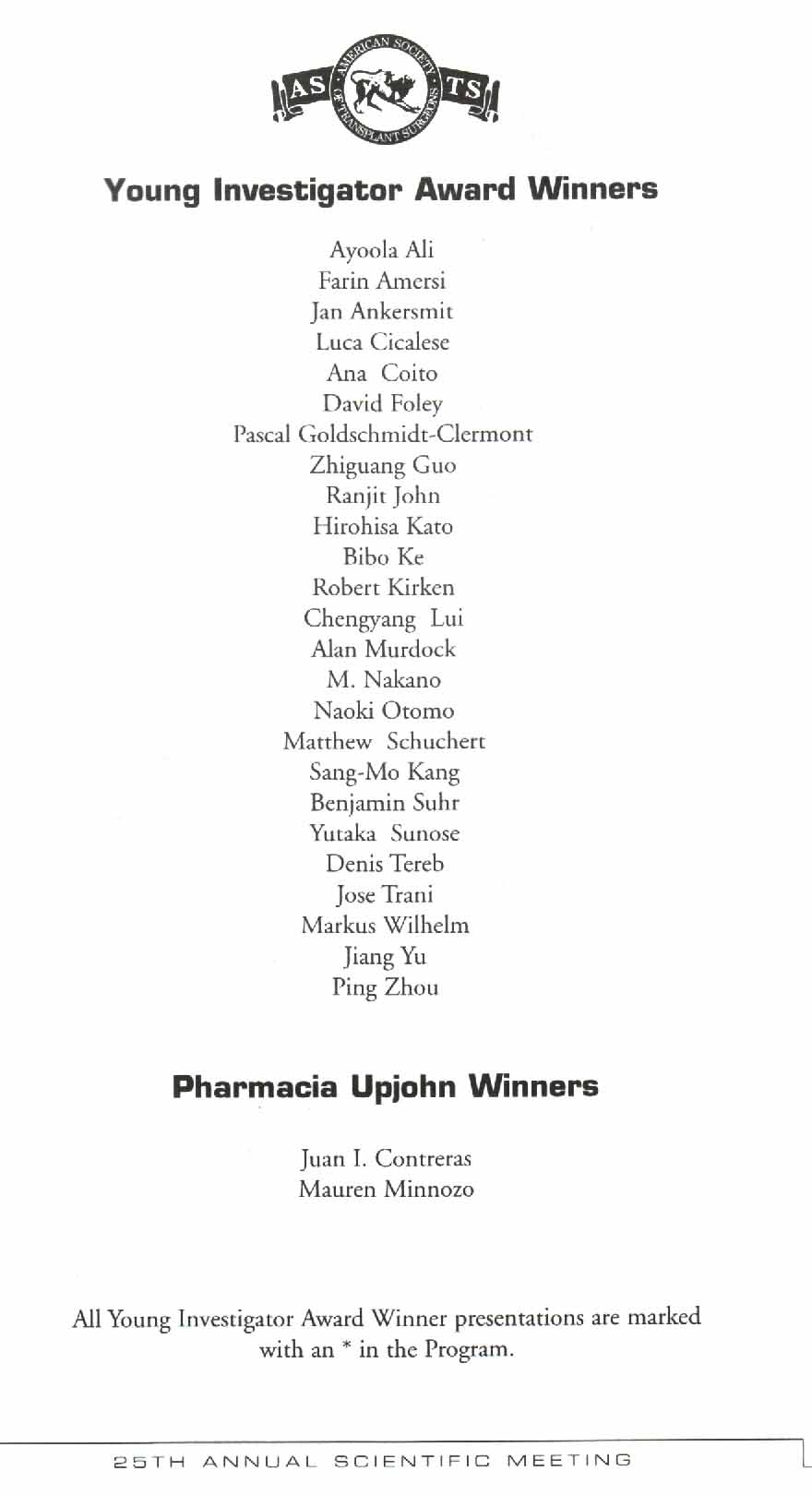Young Investigator Award Winner in 1999
I send my first research paper in America to the ASTS (American Society of Transplant Surgeon) Annual Scientific Meeting which is one of the professional meetings with highest academic level in the world. I am greatly honored by winning the Young Investigator Award from ASTS. The results produced from this study can contribute the theory of transplant immunology, which can finally result in better understanding and controling of rejection in organ and tissue transplantation.


The abstract sent to ASTS Meeting
[ABSTRACT]
DEPENDENCY OF BOTH RECIPIENT B7-1 AND 7-2 LIGANDS FOR ALLO-REJECTION IN MURINE HEART TRANSPLANTTATION
B7-1/7-2 ligands on APC are important in costimulatory pathway to activate T cells. The disruption of B7/CD28 interaction can cause transplant tolerance. To determine the importance of B7-1/7-2 ligands and the importance on donor and recipient sides, standard abdominal heterotopic heart transplant model was used in this study. Normal NOD (NOD), C3H and B7-1/7-2 knockout NOD (B7-1/2-/-NOD) mice were used as donor. Normal C57BL/6 (B6) and B7-1/7-2 knockout C57BL/6 (B7-1/2-/- B6) mice were used as recipient. The grouping and results were as shown in the table. The results demonstrate that B7-1/7-2 knockout in recipients could significantly prolong heart transplant survivals. However, B7-1 knockout alone didn't show graft survival prolongation. Though B7-2 knockout alone did prolonged the graft survival significantly, it couldn't stop rejection permanently. Interestingly, B7-1/7-2 knockout in donors didn't show any benefit for grafts survivals. When IL2 was administered in B7-1/7-2 knockout recipients, 4 out of 5 were rejected on day 13(2) and 14(2), only 1 was rejected on day 91. In RPA analysis, B7-1/7-2 recipients showed very low INF (1.03), IL6 (0.44) and IL15 (1.05) levels comparing with B6 recipients' INF (3.17), IL6 (130) and IL15 (15.48), which demonstrated significantly decreased cytokine expression in B7-1/7-2 recipients. Pathology studies confirmed the clinical observations in all these groups. Therefore, our results suggest that the allo-rejection in this transplant model is recipient B7-1/7-2 ligands dependent, but not the donor side dependent, which suggests that the indirect costimulatory pathway is the main way to initiate rejection in this murine transplant model. The mechanism of the effects by disruption of B7/CD28 interaction was show to be related to decreased expression of cytokines in which IL2 played the most important role.
HEART TRANSPLANT RECORD
____________________________________________________________
GROUPS n. MSD
------------------------------------------------------------------------------------
NOD --> B6 7 8.14
B7-1/2NOD --> B6 6 7.67
NOD --> B7-1/2-/-B6 6 >100
B7-1/2-/-NOD --> B7-1/2-/-B6 6 >100
NOD --> B7-1/2-/-B6 + IL2 5 29
NOD --> B7-1B6 8 8.67
C3H --> B7-2-/-B6(NOD) 5 21
_____________________________________________________________